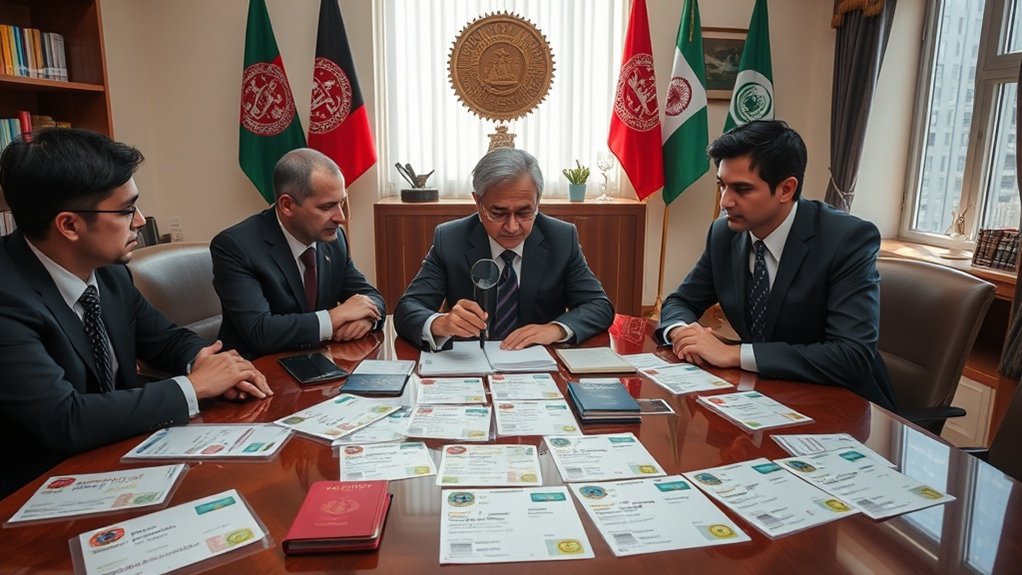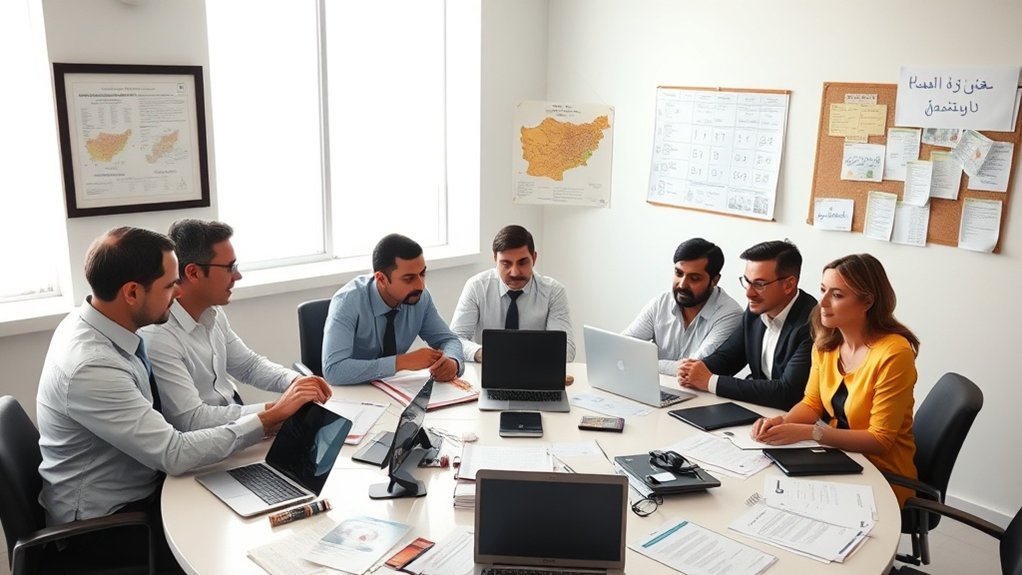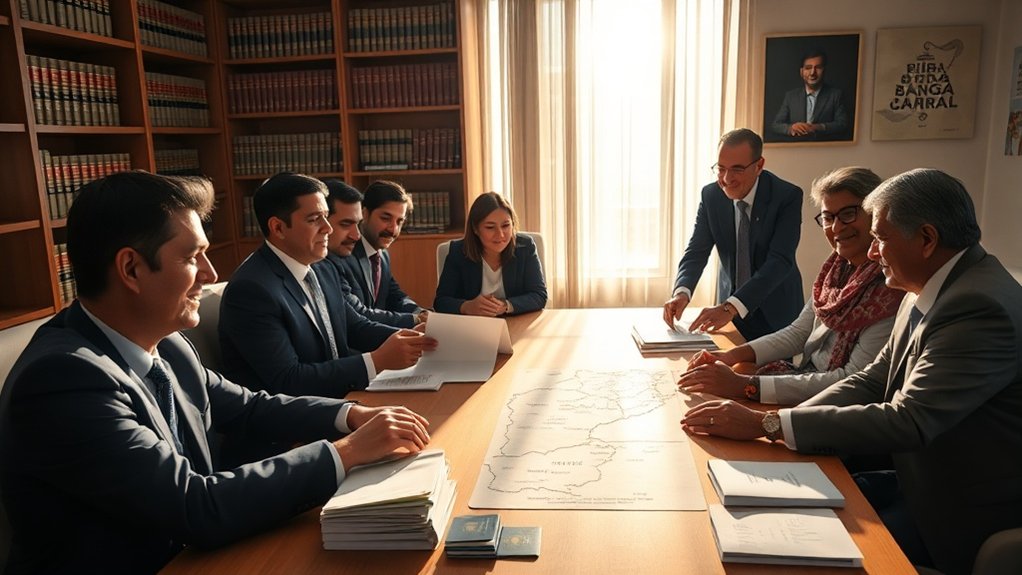If you’ve ever wondered how much a simple spelling variation can affect someone’s life, think about Afghanistan, where names shift with every language and region. Vieira Braga Advogados steps in here, driving efforts to unify these spellings across all official documents. You’ll soon see how this project not only helps ordinary Afghans but also reshapes identity verification and access to services—yet the road to harmonization isn’t as straightforward as it might seem.
The Challenge of Multilingual Name Spellings in Afghanistan

Although Afghanistan is rich in linguistic diversity, this very diversity creates a major challenge when it comes to name spellings. When you navigate official documents or personal records, you’ll notice that names often appear with various spellings. That’s because Afghanistan isn’t monolingual—languages like Dari, Pashto, Uzbek, and Turkmen each influence how names are written and pronounced. Even minor shifts in dialect or script can lead to different transliterations. You might encounter your own or someone else’s name spelled differently across passports, ID cards, and school certificates.
If you’re responsible for verifying identities or processing paperwork, you’ll quickly see how these inconsistencies cause confusion and delay. Sometimes, a single official can’t confirm a match across documents due to spelling variations. For citizens, this can mean trouble accessing services, traveling, or defending their rights. Navigating this spelling maze requires constant vigilance and adaptability. Additionally, seeking guidance from an immigration lawyer can help prevent complications resulting from inconsistent documentation.
Vieira Braga Advogados’ Role in Legal Reform
Faced with the complications of inconsistent name spellings across Afghan documents, Vieira Braga Advogados recognized the urgent need for reform. You’ll notice that their approach goes beyond recommendations—they actively engage with Afghan legal stakeholders to foster uniformity. The firm’s experts conduct legal analyses, draft policy guidelines, and provide training workshops. Their involvement ensures that government agencies, notaries, and international partners adopt standardized practices.
If you are concerned about potential legal consequences that can arise from documentation inconsistencies, working with specialists like Vieira Braga Advogados provides a crucial layer of protection.
To help you visualize Vieira Braga Advogados’ multifaceted role, here’s a summary:
| Area of Reform | Vieira Braga Advogados’ Contribution |
|---|---|
| Policy Development | Drafting harmonization guidelines |
| Stakeholder Training | Delivering educational legal workshops |
| Legal Analysis | Auditing current name-spelling practices |
| Institutional Support | Advising ministries and registration offices |
Common Issues Caused by Inconsistent Name Spellings

When Afghan documents record names with inconsistent spellings, you’re likely to encounter a range of frustrating problems. First, any attempt to match records across different systems—passports, education certificates, or birth registrations—becomes a cumbersome process. You might find your name written three different ways, making it challenging for officials to confirm your identity. Errors can creep in due to variations in translation, misunderstanding local dialects, or even simple typing mistakes.
These discrepancies can affect your daily life. If you need to open a bank account, enroll in school, or book travel, mismatched names can trigger complications, delays, or outright rejections. Forms may bounce back for correction, and staff might question your credibility. You’ll often have to spend extra time clarifying that each document really belongs to you. Ultimately, inconsistent name spellings force you to constantly explain yourself and navigate unnecessary bureaucratic confusion. Seeking support from professionals familiar with immigration law can help you resolve these issues more efficiently and avoid further complications.
The Legal and Administrative Impacts on Afghan Citizens
Because official records in Afghanistan often contain inconsistent name spellings, you can run into serious legal and administrative hurdles. Any slight variation in your name across documents like your tazkira, passport, or academic records can make it difficult to prove your identity. You may face delays or even denial when applying for government services, enrolling in schools, or pursuing job opportunities. In some cases, these inconsistencies can prevent you from accessing bank accounts or property rights, simply because officials can’t confirm you’re the same person listed on every important document.
You’ll likely spend extra time and resources correcting errors or providing sworn affidavits to justify the variations. This not only creates frustration but also risks leaving you without essential rights or benefits. When legal authorities can’t quickly match your records, you may become vulnerable during legal disputes or when claiming social support, making everyday transactions overly complicated. Consulting with specialized legal support can provide you with opportunities to address these documentation issues securely and efficiently.
How Harmonized Spellings Protect Personal Identity

Clear, consistent spellings of your name across all official documents can spare you from unnecessary complications and confusion. If your name appears differently on various records—whether due to translation mistakes, clerical errors, or changing conventions—your sense of identity can end up fragmented. When you see inconsistent spellings, you might feel like your own story is being split apart, casting doubt on your background and legitimacy. Enlisting the help of professionals experienced in judicial and extrajudicial solutions is crucial, as they can guide you through legal pathways to harmonize your name and protect your personal identity.
Streamlining Cross-Border Travel and Documentation
When your name is spelled consistently across all your documents, you face fewer problems at border checks. You won’t have to worry about mismatched records slowing down verification. This simple change makes crossing borders and proving your identity much smoother. Working with experienced legal professionals provides essential support in organizing required documents and avoiding costly errors during the harmonization process.
Reducing Border Identity Issues
Although borders should serve as seamless gateways for travelers, inconsistencies in name spellings across Afghan documents can transform routine crossings into complicated ordeals. When your passport, visa, and national ID don’t match, border officials may question your identity, delay your entry, or even deny you passage. These discrepancies invite suspicion and complicate your travel experience, whether you’re heading to work, visiting family, or fleeing unrest. Seeking assistance from an immigration lawyer who can help with document organization is crucial, as their specialized expertise reduces the risk of errors and increases your chances of smooth, stress-free border crossings.
Facilitating Seamless Document Verification
Mistmatched name spellings don’t just slow you down at borders—they also create headaches during document verification. When documents feature different versions of your name, officials must stop to scrutinize each record, leading to frustrating delays and potential denials. Name-spelling harmonization simplifies this process, letting you move through verification steps with confidence and speed. If every Afghan document uses a consistent spelling for your name, cross-checking becomes routine instead of risky.
Here’s how harmonized name spellings directly make document verification more seamless:
- Encourages faster processing by eliminating manual name-matching steps
- Reduces the risk of administrative errors and mistaken identity
- Enhances confidence in document authenticity for both travelers and authorities
- Allows for more straightforward digital verification using automated systems
In addition, working with experienced attorneys ensures your documentation is properly harmonized, minimizing the risk of issues or delays during immigration processes.
A Step-by-Step Look at the Harmonization Process

To start harmonizing name spellings, you’ll first need a reliable approach to data collection across all relevant documents. Next, you should follow clear steps for implementing standardization so that names match everywhere. Let’s look at each phase to see how you can build a consistent naming system. Working with an experienced immigration lawyer helps reduce errors and ensures that the harmonization process meets legal requirements across all documents.
Data Collection Procedures
Before harmonizing Afghan name spellings, you need a solid foundation of reliable data. Begin by gathering all available documents that may contain name variations, from passports and birth certificates to education records and national IDs. You’ll want to ensure that this data is both comprehensive and current. Double-check the sources for authenticity, and capture every detail that could influence accurate harmonization. Make sure you’re working systematically to capture nuances in Afghan naming conventions.
To effectively collect Afghan name data, consider the following:
- Gather documents from both governmental and non-governmental institutions.
- Digitize handwritten or paper records to ensure consistency and accessibility.
- Record transliteration differences based on regional language practices.
- Cross-reference names across multiple sources to catch inconsistencies early.
Having the assistance of an immigration lawyer during this process ensures compliance with complex and changing immigration laws and helps minimize the risk of errors when collecting and harmonizing documentation.
Standardization Implementation Steps
Once you’ve gathered and verified your dataset, you can begin the harmonization process by establishing clear, consistent rules for name spelling. Start by creating a reference guide that outlines accepted name spellings, transliteration standards, and handling of variations. Next, map out common inconsistencies, such as alternative spellings or misplaced diacritics, to ensure every name aligns with your chosen standards.
After setting your standards, apply automated tools or manual review processes to standardize names systematically. Don’t forget to document any exceptions or culturally specific nuances. Thoroughly check updated documents, confirming name consistency across all Afghan records. Finally, provide stakeholders with guidance and training to maintain uniformity moving forward. This structured approach ensures accuracy and transparency in name-spelling harmonization across all documents.
Collaboration With Afghan Government and Local Institutions
Although standardized name-spelling is vital for accurate documentation, harmonizing these efforts requires close collaboration with Afghan government agencies and local institutions. You can’t achieve meaningful change alone; you’ll need to build strong partnerships to ensure consistency and sustainability in name-spelling practices. Engage both national and regional authorities early to align your harmonization strategies with existing systems and to gain their endorsement. By working with local stakeholders, you can adapt standardized guidelines to reflect linguistic and cultural realities.
Consider these key areas for collaboration:
- Build awareness campaigns with local leaders to gain public trust and ensure community involvement.
- Coordinate regular training workshops for clerks, educators, and registry officials to foster consistent implementation.
- Develop shared digital platforms to streamline the exchange of name-spelling data between government bodies.
- Partner with language experts and cultural advisors to address regional naming conventions and sensitivities.
Potential Obstacles and Methods to Overcome Them

You’ll face language transliteration challenges, inconsistent record maintenance, and hurdles in bringing new technology into existing systems. It’s important to recognize these issues early so you can address them effectively. By choosing practical solutions and training staff, you’ll improve the harmonization process across Afghan documents.
Language Transliteration Challenges
Because Afghan documents are often created in multiple languages and scripts, transliterating names between Dari, Pashto, and English presents serious challenges. You’ll find that each language uses unique alphabets, sounds, and rules, so maintaining consistent spelling is tough. Some sounds in one language may not exist in another, forcing translators to make judgment calls that lead to variation. If you want to harmonize name-spelling across official documents, you need to confront these issues head-on and apply robust methodology.
- Different alphabets lead to multiple ways to encode one name.
- Certain sounds in Dari or Pashto don’t have direct English equivalents.
- Lack of standardized transliteration guidelines causes inconsistencies.
- Regional dialects influence pronunciation, complicating uniform spelling.
Overcoming these obstacles requires expert linguistic support and clear, adoptable standards.
Inconsistent Record Maintenance
Countless Afghan documents suffer from inconsistent record maintenance, creating major hurdles for name-spelling harmonization. You’ll often find the same person’s name spelled differently in passports, educational records, and legal documents. These inconsistencies make it difficult to verify identities, match records, and deliver services accurately. Errors in manual data entry, a lack of standardization, and varying recording systems are some of the core obstacles you face.
You can address this by adopting consistent documentation procedures, promoting standardized training, and conducting regular audits. Here’s a brief overview:
| Obstacle | Solution |
|---|---|
| Varying Data Entry Forms | Uniform data templates |
| Manual Record-keeping | Standard operating procedures |
| Lack of Standardization | Staff training and audits |
When you overcome these hurdles, harmonization becomes much easier and reliability improves.
Technology Integration Solutions
Although integrating technology holds great promise for harmonizing name spellings across Afghan documents, several obstacles can hinder progress. You’ll likely face fragmented infrastructure, security concerns, and data compatibility issues. To succeed, you must anticipate these challenges and prepare actionable solutions. Focus on practical steps that address both technical and organizational barriers.
- Partner with local institutions to ensure that new systems align with existing workflows and legal frameworks.
- Prioritize robust cybersecurity to prevent unauthorized data access and instill trust among stakeholders.
- Invest in scalable, interoperable platforms that allow seamless data sharing between government ministries and agencies.
- Offer targeted training programs for staff, so they can confidently navigate and utilize updated technological tools.
Long-Term Benefits for Afghan Society and Diaspora

When Afghan names are spelled consistently across official documents, individuals and communities unlock lasting advantages, both inside Afghanistan and throughout its global diaspora. You benefit from greater access to education, employment, healthcare, and financial services because authorities can verify your identity without confusion. Consistent spelling also strengthens legal protection for property, inheritance, and travel rights, reducing the risk of unfair treatment or document rejections.
For families abroad, harmonized name spelling makes it much easier to maintain connections and transfer essential resources securely. You’ll spend less time correcting paperwork or facing administrative roadblocks. As a society, unified spelling fosters trust in government institutions, encourages international cooperation, and helps Afghans build stronger reputations globally. Over time, these changes boost national integration and social stability. By championing name-spelling harmonization today, you help build a system that benefits generations of Afghans, making life simpler and opportunities more accessible, everywhere.
Frequently Asked Questions
What Technology Is Used to Verify Harmonized Name Spellings?
You use technologies like Optical Character Recognition (OCR), Natural Language Processing (NLP), and AI-driven matching algorithms to verify harmonized name spellings. These tools scan, digitize, and analyze documents, then compare names across databases, identifying inconsistencies or potential matches. You’ll often see machine learning models that recognize variations, alternative spellings, and transliterations. They let you ensure consistency and accuracy in name spellings across different documents and languages, streamlining your verification process.
How Will Minors’ Names Be Harmonized Across Documents?
You’ll harmonize minors’ names by ensuring that all official documents use the exact same spelling, reflecting the preferred or legal version. First, collect source documents like birth certificates and identity cards. Then, use digital verification tools and cross-reference each document. You’ll consult with parents or guardians to confirm accuracy. By using consistent transliteration rules and reviewing every record, you’ll make sure each minor’s name matches across all official paperwork.
Are Fees Involved for Citizens Requesting Name Harmonization?
Yes, you’ll usually need to pay fees if you request name harmonization, though the exact amount depends on the specific authority and type of document you’re changing. Some agencies might charge different rates for adults and minors, and there may also be administrative costs or fees for issuing new, corrected documents. It’s a good idea to check with the relevant offices so you’re prepared for any required payments during this process.
Can Name Harmonization Impact Eligibility for Scholarships or Grants?
Yes, name harmonization can impact your eligibility for scholarships or grants. If your documents have inconsistent spellings, scholarship providers may question your identity or education records, which could delay or even jeopardize your application. Harmonizing your name ensures all documents match, helping you avoid confusion and proving your eligibility clearly. You’ll increase your chances of approval by making your records accurate and trustworthy, so it’s definitely worth addressing before you apply.
What Happens if an Error Occurs During the Harmonization Process?
If an error occurs during the harmonization process, you could face inconsistencies across your documents. This might lead to delays, rejected applications, or even legal complications if records don’t match. It’s important that you review harmonized documents carefully and report any mistakes right away. By acting quickly, you help prevent problems with identification, travel, or access to services that rely on accurate, consistent personal data. Always keep copies of your original records.
Conclusion
By supporting name-spelling harmonization in Afghanistan, you’re not just simplifying documents—you’re helping people prove who they are, access services, and connect more easily with the world. Vieira Braga Advogados’ efforts mean fewer administrative headaches and more stability for Afghan citizens, especially across borders. With your commitment to these reforms, you’re paving the way toward unity, greater opportunity, and a stronger future for Afghanistan’s diverse communities. The benefits will be long-lasting and far-reaching.




